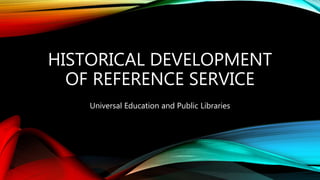
Historical development of reference service
- 1. HISTORICAL DEVELOPMENT OF REFERENCE SERVICE Universal Education and Public Libraries
- 2. 19 CENTURY IDEALS • Universal Education and Public Libraries (2 movements)That reference service was developed • Universal education was the concept that all children in the United States, no matter what class, race, or religion would be able to receive free public education • Business Leader– create better worker • Labor Leader—a way for people to move up in society • Religious leader—a way to make it possible for more people to read the Bible • Politician—way to create a single national identity to immigrants
- 3. RESULT OF UNIVERSAL EDUCATION • Literacy rate in the United States rose significantly • 1850—1870 literacy rate had risen to 88.5 percent • Concept of free public library was being established
- 4. BOSTON PUBLIC LIBRARY • The question is not what will be brought about by a few individuals of indomitable will and an ardent thirst for improvement, but what is most for the advantage of the mass of the community. In this point of view we consider that a large public library is of the utmost importance as the means of completing our system of public education
- 5. MARCH 20, 1854 Boston public library opened it’s door to the public—It was an instant success
- 6. WHAT DOES THE DEVELOPMENT OF UNIVERSAL EDUCATION AND PUBLIC LIBRARIES HAVE TO DO WITH REFERENCE SERVICE ?
- 7. •Reference Service came about as a direct result of these two innovations ►Universal Education taught the public to read, and ► public offered materials to read
- 8. MELVIL DEWEY •The school teaches them to read; the library must supply them with reading which will serve to educate, and so it is that we are force to divide popular education into two parts of almost equal importance and deserving equal attention: the free school and the free library
- 9. 1876 BORN OF REFERENCE SERVICE •The newly literate members of the society knew how to read, but not how to use a library. They came into the library in ever-increasing numbers but did not know what they wanted to read. Naturally, they asked the librarian for advice. By 1876, the idea of reference service had been born
- 10. SAMUEL SWETT GREEN AND THE FOUNDING OF REFERENCE SERVICE • The 1st discussion of any type of direct service by librarians to help library users was a paper presented by Samuel Sweet Green at the first conference of the American Library Association in Philadelphia. His paper, “ Personal Intercourse and relations between Librarians and Readers in Popular Libraries, outlined the concept of the librarian interacting with and assisting the reader; he did not use the term “reference service” because that term had not yet been developed 1st volume of Library Journal---1st professional discussion of what we now call reference service
- 11. ACADEMIC LIBRARY POSITIVE REACTIONS • Otis Robinson – University of Rochester heartily endorsed the concept • Reuben Guild – Brown University described the availability of librarians to the public at is University • Columbia College – Dewey 1st to establish a team of librarians to provide personal assistance to users • 1st to use the phrase “reference department”
- 12. ORIGINAL FUNCTION OF REFERENCE LIBRARIAN What exactly does a reference librarian do? 1. Teach people how to use the library and its resources. Some know, some unfamiliar. The first function of the librarian providing personal assistance to readers was to teach them how to find things in the library. Green States, “Give the as much assistance as they need, but try at the same time to teach them to rely upon themselves and become independent.”
- 13. ORIGINAL FUNCTION OF REFERENCE LIBRARIAN • 2. answer reader’s question. ( provide source that will answer all of these type of question) • Types of queries----a. Simple factual queries b. in-depth research project. 3. Aid the reader in the selection of good books serves as a readers advisor. People wanted to read but did not know what was worth reading
- 14. ORIGINAL FUNCTION OF REFERENCE LIBRARIAN • 4. promote the library within the community if you help them, they will come---and provide money! Greens concept that by being personally available to members of the community, the librarian would generate support from the community, which of course would lead to more use of the library and greater financial support.
- 15. CHANGES SINCE 1876 • Much has changed since 1876. The area that is most obviously different is the technology used in libraries. Whereas in Green’s time had essentially two formats, books and periodicals. What type of resources use today? What cause these transformation?
- 16. CHANGES SINCE 1876: DIVERSITY • 19th century English and many dozens of languages • Incorporate immigrants from Asia, Africa, and Latin America • Adult and children, teens, senior citizens, veterans, PWD, students, teachers, business community, unemployed and virtually. • WHAT IS THE IMPACT OF DIVERSITY TO REFERENCE SERVICE? Creating need to respond to those demographic changes
- 17. FUNCTIONS OF THE REFERENCE LIBRARIAN TODAY 1. Assistance and instruction (formal or informal in the use of library 2. assistance in the identification and selection of books, journals and other materials relevant to a particular information need. 3. Provision of brief, factual information of the ready reference variety
- 18. RESEARCH WORK What is Reference transaction What is Reference work What are the styles of reference service What are the types of reference service? Describe each Who is Samuel Rothstein Who is James Wyer What are the models of reference service? What is reference interview
